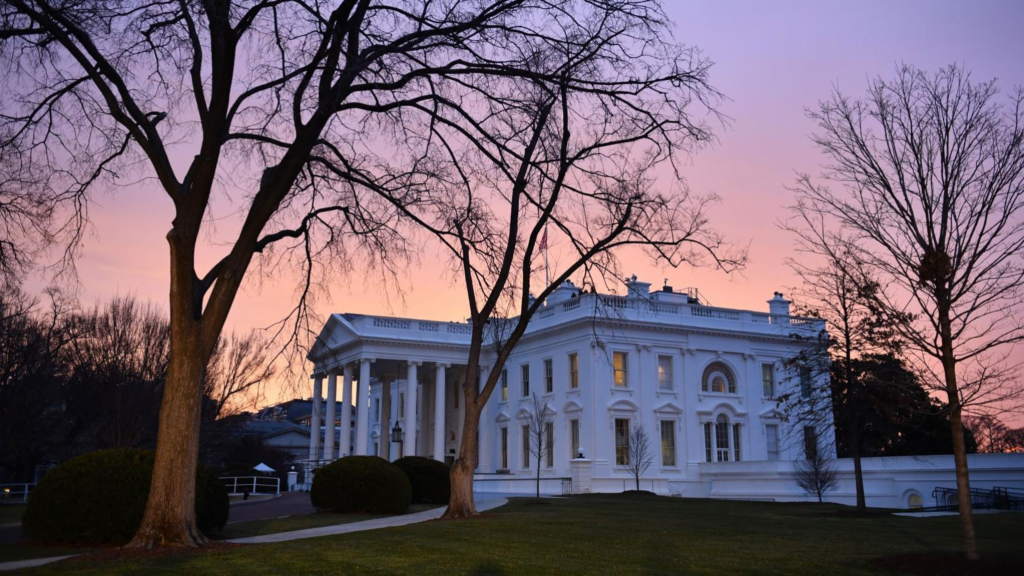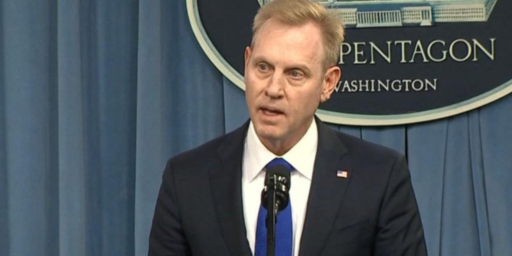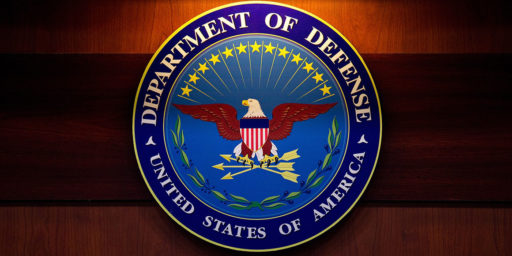The Pentagon and White House are Not People and Don’t Do Things
A misleading, annoying media trope that needs to go away.

A story from AP’s Lolita Baldor titled “Pentagon tells White House to stop politicizing military” is driving me nuts. My initial reaction was that an outrageous violation of civil-military relations had occurred. But, no, all that happened was lazy writing.
Usually, these things are the fault of a headline writer who is either trying to describe a complex story in a limited space and/or grab reader attention with a sensationalized heading. But the fault here is Baldor’s, as the error is in the lede:
The Pentagon has told the White House to stop politicizing the military, amid a furor over a Trump administration order to have the Navy ship named for the late U.S. Sen. John McCain hidden from view during President Donald Trump’s recent visit to Japan.
The Pentagon and the White House are office buildings. They do not talk. They’re often used as shorthand for high-ranking officials who work in said buildings and, sometimes, that’s fine. Here, though, it gives a false impression.
Had high-ranking members of the uniformed military—which is what I tend to think when people say “the Pentagon” did something—told high-ranking civilian officials—much less the Commander-in-Chief—not to do something, it would be outrageous. But there’s no indication in the story itself that this happened. Indeed, while Baldor is usually an excellent reporter, it’s not at all clear from the story what actually did happen.
Trump’s top aide scoffed at the idea that anyone working for the White House might be punished. “We think it’s much ado about nothing.”
A U.S. defense official said Patrick Shanahan, Trump’s acting defense chief, is also considering sending out formal guidance to military units in order to avoid similar problems in the future.Shanahan confirmed details about a Navy email that said the White House military office wanted the USS John McCain kept “out of sight” when Trump was in Japan about a week ago. The internal Navy email came to light last week, triggering a storm of outrage.
Nothing thus far has anything to do with the headline or the lede.
Trump’s top aide is right, for reasons we’ll get to in a bit. And Shanahan, who as a civilian policymaker actually has every right to make strong suggestions to the President about such things, isn’t actually doing that here. Instead, he’s “considering” offering better guidance to his subordinates.
Trump, who long feuded with McCain, has said he knew nothing about the request, but added that “somebody did it because they thought I didn’t like him, OK? And they were well-meaning, I will say.”
Shanahan told reporters traveling with him to South Korea on Sunday that he is not planning to seek an investigation by the Pentagon’s internal watchdog into the matter “because there was nothing carried out” by the Navy. He added that he still needs to gather more information about exactly what happened and what service members did.
“How did the people receiving the information — how did they treat it,” Shanahan said. “That would give me an understanding on the next steps” to take.Shanahan did not detail what those steps could be, but a defense official said Shanahan is considering a clearer directive to the military about avoiding political situations. The goal would be to ensure there is less ambiguity about how the military should support VIP events and how service members should respond to such political requests, said the official, who spoke on condition of anonymity to discuss internal deliberations.
Again, nobody in the Pentagon is telling anyone in the White House anything here. Shanahan seems to be pondering clarifying procedures. Which he should definitely do. More on that latter, too.
The order to keep the Navy destroyer out of sight reflected what appeared to be an extraordinary White House effort to avoid offending an unpredictable president known for holding a grudge, including a particularly bitter one against McCain.
Trump’s acting chief of staff, in appearances on two Sunday news shows in the U.S., said he did not expect anyone working for the White House to face discipline. “To think that you’re going to get fired over this is silly,” said Mick Mulvaney, making the comparison to someone who tries to sit bickering colleagues apart from each other at an office meeting.
“The fact that some 23- or 24-year-old person on the advance team went to that site and said ‘Oh my goodness, there’s the John McCain, we all know how the president feels about the former senator, maybe that’s not the best backdrop, can somebody look into moving it?’ That’s not an unreasonable thing to ask,” Mulvaney said.
If in fact “some 23- or 24-year-old person on the advance team” was responsible for the directive, I’m one hundred percent with Mulvaney on this. Junior staffers for even ordinary bosses sometimes go overboard in an effort to please them. It’s perfectly understandable that an eager beaver working for Trump would think hiding the McCain would be a good idea. That it was actually a really, really bad idea for a whole host of reasons strikes me as a teachable moment, not a cause for firing. Loyalty ought run both ways and it sends a terrible message to fire someone for exuberance of initiative.
At the same time, Shanahan should indeed issue clarifying directives to convey the message that “the White House” is not the Commander-in-Chief, the President is. Orders to do things like moving a goddamn guided missile destroyer come through the chain of command, not some snot-nosed staffer. If a staffer makes such a request, run it up the flagpole before acting.
This isn’t a new issue or one particular to this administration. Rosa Brooks, who served as a senior Pentagon official for President Obama, described the situation a few years ago:
Here’s a small but not atypical example. A few readers may remember the spring 2010 crisis in Kyrgyzstan. Several hundred people were killed by police and ethnically aligned mobs, many more were wounded, and thousands of refugees (mostly from the Uzbek minority population) fled their homes.
Within the White House, these events triggered fears of a possible ethnic cleansing campaign to come, or even genocide. One day, I got a call from a member of the White House’s National Security Staff (NSS). With little preamble, he told me that Centcom needed to “move a surveillance drone over Kyrgyzstan, ASAP, so we can figure out what’s going on there.”
This wasn’t such a crazy idea. Drones and other intelligence, surveillance, and reconnaissance assets have the potential to be powerful tools in human rights monitoring. The ability to watch troops or mobs or refugees move in real time, to see weapons being stockpiled or mass graves being filled, might help us take timely and appropriate action to stop a genocide before it gets off the ground.
There was one enormous problem with my NSS colleague’s request, though: Neither of us had the authority to order Centcom to immediately shift a potentially vital asset from wherever it was currently being used to the skies over Kyrgyzstan.
“It’s an interesting idea,” I told him. “Has the president discussed it with [Defense] Secretary Gates?”
“We don’t have time to spin up a whole bureaucratic process,” he responded irritably. “The president doesn’t want another Rwanda. This is a top priority of his. I need you to just communicate this to Centcom and get this moving.”
This, I explained, wasn’t going to work. The chain of command doesn’t go from a director at the NSS to an advisor to the defense undersecretary for policy to Centcom — and the military doesn’t put drones into foreign airspace without a great deal of planning, a lot of legal advice, and the right people signing off on the whole idea.
My friend was incredulous. “We’re talking about, like, one drone. You’re telling me you can’t just call some colonel at Centcom and make this happen?”
“I’m afraid so.”
“Why the hell not? You guys” — meaning the Pentagon writ large — “are always stonewalling us on everything. I’m calling you from the White House. The president wants to prevent genocide in Kyrgyzstan. Whatever happened to civilian control of the military?”
“You,” I told him, “are the wrong civilian.”
Assuming the order regarding the McCain indeed came from some over-eager staffer and not someone high in the chain of command, it came from the wrong civilian. And the leadership of the McCain should have goddamn well known that and gotten verification before doing something so stupid.
Now, if Mulvaney and company are lying and the order in fact came from the President, the Acting Secretary of Defense, or some other official with the authority to order guided missile destroyers around, then we have a whole different problem.





James –
While I absolutely agree with you that a real issue is a misunderstanding of Chain of Command (and the fact that staff at the WH think Trump is a toddler with poor impulse control), the reality is that entities are “people”. They act through their staff but entities are considered “people” under existing law. I don’t see why the White House of the Pentagon can’t be described as acting that way in the same way we would talk about Apple, Amazon, Congress or the Trump Administration.
@SKI:
When we talk about Apple or Amazon doing things, we’re referring to a corporate decision, not the action of low-level employees. When we say “Congress” did something, we mean a collective vote of both Houses. “The Trump Administration” is as confusing as “the White House,” in that it could mean just about anything. But it makes perfect sense to talk about past administrations that way, because we’re presumably talking about major policy initiatives.
I don’t mind the “Pentagon” or “White House” shorthands when it’s clear what they refer to. Here, though, it’s like poor use of the passive voice: it obscures agency. Moreover, readers will naturally think we’re talking about the senior-most officials when often we’re not.
@James Joyner: It almost always isn’t the senior most officials for any of these – when they are bad or generate negative press. But the buck does stop with them.
Contra Mulvaney, it wasn’t “someone asking the question” – it was the White House Military Office making a very explicit and direct request. They didn’t have the authority to issue the order due to chain of command issues as you note but it wasn’t some random intern – it was whomever was assigned by the White House to coordinate and facilitate the trip. They were, quite literally, authorized to act on behalf of the White House Military Office. Given that, the phrasing was entirely appropriate.
I think Mulvaney is doing that staffer a disservice. More likely the advance team realized that if the USS McCain was used as a backdrop, the chatterers in the media would seize upon it. So of all the ships, that shouldn’t be one of those in the background letting the monkeys in the media derail things. Of course, for that meeting they are the “White House” and some 23 yr old base media liaison translates it to look good, etc. All at staff level without bothering the chain of command. If someone actually did something outside the chain of command, then that needs to be counseled.
And here we are, the only reason this being a media issue being that it was the ship named after John McCain giving the media a hook that I suspect will turn out to be less than not fake.
Excellent post, I agree entirely. I also thought the Kyrgyzstan situation was analogous to this – I’m glad you mentioned it.
Did the USS McCain actually get moved in response to this request? I’ve seen conflicting reports.
@JKB:
What are you trying to say here? I can’t parse it into anything that makes sense.
Oh, and the ship wasn’t named for Senator John McCain. It was named for his grandfather and father, both 4 star admirals.
@Andy:
No, it was not moved but a tarp was placed to cover the name and sailors from the ship have reported being turned away from the speech itself.
Shorter JKB: “My president is an actual traitor and a disgrace to the country and I’m 100% with him because he hates the same people I hate”
@SKI:
This. And, James, that’s why this is a BFD. If it had ended with some junior White House staffer being ignored, you would have a point. But it ended with a Navy Captain (at least) ordering that the name be covered up, and someone else fairly high up in the command instructing that peday we make hold the very concept of the Porsonnel be punished for wearing their ship’s name.
It is a pretty dumb story all around.
The principle event here is not particularly a new thought. I hear from time to time about some blogger who’s compiling a list of stories that show our President being referred to in terms that befit a toddler or baby.
The figure-of-speech being questioned in the headline is of course called ‘metonymy’. James Thurber wrote a wonderful short article about it back before any of us were born. A way to remember it: “Using the name of the container for the thing contained.”
@MarkedMan:
Whoa. What happened there? I meant to say “and someone else in the chain of command instruction that Navy personnel be punished for where their ship’s name.”
I used to write news stories for the Pacifica radio station in Berkeley, almost 50 yrs. ago. We used the then-AP stylebook, & I remember this being an issue. As the editor told us, “buildings don’t speak.” I can’t, alas, quite remember if that AP stylebook approved of speaking buildings, or it didn’t, & that was the one exception we made.
Fascinating. When I hear something attributed to “the Pentagon”, I think “the Department of Defense”, which includes the military departments but is (still, for now) headed by civilians.
Now, certainly if someone says that “the Pentagon” made some statement about (say) troop deployments or operational plans, I would probably assume that the speaker was uniformed military — but only because that’s the appropriate office to be making such statements. If it were a statement about military pension plans, I would probably assume it was a civilian, even with the same attribution.
@James Joyner:
Well…. actually it is more or less the same thing, journos tend to have the bad habit of referring to organizations (corps, govs, etc) as if they are unitary actors. Even an Apple or an Amazon doing something may or may not be an explicit corporate decision than a collective blundering along of a collection of unit managers…
@JKB: What a vile servile little Bolshevik apparatchik you are, trying to displace a Party error onto others.
Of course the real risk was not “media monkeys” but the childish Orangutan that would have no self-discipline to control himself over the McCain ship and would be, unlike any statesmen, but very much like some Dear Leader type, be provoked into reacting to otherwise trivial comment.
The sole and unique responsibility lies with a third-world style fascist-manqué pseudo-billionaire who has created the environment around him where staffers feel – with abundant evidence that they are correct – need to handle him like a petulant spoiled crybaby.
All this parsing of exactly who requested what and what exactly the Navy did or didn’t do is playing into Trump’s hands. The only issue is whether he has established a boot licking atmosphere for his staff in which this sort of sycophancy over trivia is regarded as normal. As nearly everyone has observed, we can consider whether Trump might be a functioning adult when his staff stop treating him like an infant.
@MarkedMan:
I’m not arguing that the McCain incident isn’t a big deal; I’m arguing that this particular report is bad in a way that a lot of other reports on different incidents are also bad.
A junior staffer thinking this was a good idea isn’t all that big a deal to me. The bigger ideal is that the President is such a childish oaf that a staffer would think it was what he wanted. But the ship’s captain going along with this is arguably the biggest outrage here: He should have demanded verification from someone much more senior.
@JohnMcC:
Again, I think there are perfectly good reasons to talk about buildings and organizations as if they were living entities at times. I just think that, all too often, “White House” and “Pentagon” are either used sloppily or with intent to deceive and give the impression that someone at the top did something they didn’t.
@James Joyner: You make a good point on that. It has always bugged me that “Wells Fargo” cheated its customers. No, some individuals known to the Feds authorized cheating. The press is complicit in hiding their names.